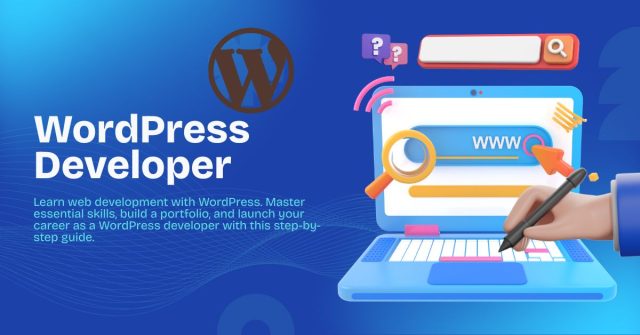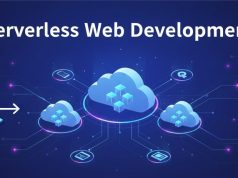This guide explains how to become a WordPress developer, covering essential skills, learning paths, portfolio building, and career opportunities. It highlights WordPress’s market demand, tools, and technologies, helping beginners and professionals build successful careers in WordPress development.
WordPress powers over 40% of all websites on the internet, making it the most popular content management system in the world. This massive market share creates tremendous opportunities for skilled WordPress developers who can build, customize, and maintain these sites.
If you’re considering a career in web development, specializing in WordPress offers a clear path to steady work and good income potential. The platform’s popularity means businesses constantly need developers who can create custom themes, build plugins, optimize performance, and solve complex technical challenges.
This comprehensive guide will walk you through everything you need to know about becoming a WordPress developer, from the essential skills you’ll need to master to the steps for landing your first clients or job opportunities.
What Does a WordPress Developer Do?

WordPress developers specialize in creating and maintaining websites using the WordPress platform. Their responsibilities span a wide range of technical tasks that keep WordPress sites running smoothly and looking professional.
The day-to-day work typically involves writing custom code to extend WordPress functionality, troubleshooting technical issues, and optimizing sites for speed and search engine visibility. Many developers also handle ongoing maintenance tasks like security updates, backups, and performance monitoring.
Frontend vs Backend Development
WordPress development generally falls into two main categories. Frontend developers focus on what users see and interact with, working primarily with HTML, CSS, JavaScript, and PHP to create visually appealing and user-friendly interfaces.
Backend developers handle the server-side functionality that powers WordPress sites. They work more extensively with PHP, MySQL databases, and server configurations to ensure sites operate efficiently and securely behind the scenes.
Many WordPress developers work as full-stack developers, handling both frontend and backend tasks depending on project needs.
Essential Skills for WordPress Development

Success as a WordPress developer requires mastering several key programming languages and technical concepts. While you don’t need to become an expert in everything immediately, building a solid foundation in these areas will set you up for long-term success.
Core Programming Languages
PHP serves as the backbone of WordPress development. Since WordPress is built entirely in PHP, you’ll need strong skills in this server-side language to create custom functionality, modify existing features, and troubleshoot issues effectively.
HTML and CSS form the foundation of all web development. You’ll use HTML to structure content and CSS to control visual styling and layout. Modern CSS frameworks like Bootstrap or Tailwind can accelerate your development process.
JavaScript brings interactivity to WordPress sites. Knowledge of JavaScript libraries like jQuery (which WordPress includes by default) and modern frameworks like React will expand your capabilities significantly.
MySQL database skills become crucial when you need to optimize queries, troubleshoot performance issues, or create custom database solutions for complex WordPress projects.
WordPress-Specific Knowledge
Understanding WordPress architecture helps you work more efficiently within the platform’s structure. This includes learning about the WordPress file hierarchy, understanding how themes and plugins interact, and knowing WordPress coding standards.
The WordPress REST API enables you to create headless WordPress installations and integrate WordPress with other applications. This knowledge becomes increasingly valuable as more projects require these advanced integrations.
WordPress security best practices protect your projects from common vulnerabilities. Learning about proper data sanitization, user authentication, and security hardening techniques will make you a more valuable developer.
Getting Started: Your Learning Path
Beginning your WordPress development journey requires a strategic approach to learning. Start with the fundamentals before moving to more advanced topics.
Step 1: Master the Basics
Begin with HTML, CSS, and basic JavaScript if you haven’t already. Many free resources like freeCodeCamp, MDN Web Docs, and W3Schools provide excellent tutorials for these foundational technologies.
Once you’re comfortable with web development basics, dive into PHP. Understanding variables, functions, arrays, and object-oriented programming concepts will prepare you for WordPress-specific PHP development.
Step 2: Learn WordPress Fundamentals
Install WordPress locally using tools like XAMPP, MAMP, or Local by Flywheel. This gives you a safe environment to experiment without affecting live websites.
Study the WordPress Codex and Developer Handbook to understand WordPress functions, hooks, and best practices. These official resources provide authoritative guidance on proper WordPress development techniques.
Build your first custom theme by converting a static HTML/CSS layout into a dynamic WordPress theme. This hands-on project will teach you about template files, the WordPress Loop, and how to properly enqueue stylesheets and scripts.
Step 3: Practice with Real Projects
Create several practice websites showcasing different skills. Build a blog theme, an e-commerce site using WooCommerce, and a business website with custom post types and fields.
Contribute to open-source WordPress projects on GitHub. This exposes you to larger codebases and collaboration workflows while building your professional network.
Building Your WordPress Development Portfolio

A strong portfolio demonstrates your skills to potential clients and employers. Your portfolio should showcase both technical abilities and design sensibilities across different types of WordPress projects.
Portfolio Project Ideas
Custom Theme Development: Create original WordPress themes that demonstrate your ability to transform design concepts into functional websites. Include at least one responsive theme that works well across different devices.
Plugin Development: Build custom plugins that solve real problems. Even simple plugins like custom contact forms or social media integrations show your understanding of WordPress architecture and coding standards.
Website Optimization: Document before-and-after results from performance optimization projects. Include specific metrics like page load times, Google PageSpeed scores, and user experience improvements.
E-commerce Solutions: Develop WooCommerce-based online stores that showcase your ability to handle complex functionality like payment processing, inventory management, and custom shipping calculations.
Showcasing Your Work
Create a professional website to display your portfolio projects. Use WordPress to build your own site, demonstrating your skills while providing a platform to showcase your work.
Include case studies that explain your problem-solving process, not just the final results. Describe the challenges you faced, the solutions you implemented, and the outcomes you achieved for each project.
Make your code available on GitHub so potential employers or clients can review your coding style and technical approach. Well-organized, commented code demonstrates professionalism and attention to detail.
Finding WordPress Development Opportunities

The job market for WordPress developers offers multiple paths to building a successful career. You can work as a freelancer, join an agency, or pursue full-time employment with companies that rely heavily on WordPress.
Freelance Development
Freelancing provides flexibility and potential for high earnings, but requires strong business skills alongside technical expertise. Start by offering services to local businesses or through platforms like Upwork, Freelancer, or Toptal.
Building long-term client relationships often proves more profitable than constantly seeking new projects. Focus on delivering exceptional results and maintaining ongoing relationships through maintenance contracts and additional development work.
Agency and In-House Positions
WordPress agencies specialize in building custom WordPress solutions for clients. These positions offer steady income, collaboration with other developers, and exposure to diverse projects.
Many companies use WordPress for their primary website and need in-house developers to maintain and enhance their digital presence. These roles often include responsibilities beyond pure development, such as digital marketing integration and content management.
Remote Work Opportunities
WordPress development lends itself well to remote work since most tasks can be completed from anywhere with a good internet connection. Many companies and agencies hire remote WordPress developers, expanding your potential job market significantly.
Building a strong online presence through social media, professional networks, and contributions to WordPress communities can help you discover remote opportunities that might not be advertised through traditional job boards.
Staying Current with WordPress Development
Web development evolves rapidly, and WordPress development is no exception. Staying current with new technologies, best practices, and platform updates ensures your skills remain valuable in the marketplace.
Continuous Learning Resources
Follow WordPress development blogs like WP Tavern, Torque Magazine, and the official WordPress Developer Blog to stay informed about platform changes and industry trends.
Attend WordPress conferences and meetups, both in-person and virtual. WordCamps happen regularly around the world and provide excellent networking and learning opportunities.
Take advantage of online learning platforms like Udemy, Coursera, and LinkedIn Learning, which regularly update their WordPress development courses to reflect current best practices.
Expanding Your Skill Set
Learn modern development tools like Git for version control, npm for package management, and build tools like webpack or Gulp for automated development workflows.
Explore headless WordPress development using modern JavaScript frameworks like React, Vue.js, or Angular combined with the WordPress REST API. This approach to web development is growing in popularity for large, complex projects.
Consider specializing in specific areas like WordPress security, performance optimization, or accessibility compliance. Specialized expertise often commands higher rates and opens doors to more interesting projects.
Taking the Next Step in Your WordPress Career
Becoming a proficient WordPress developer requires dedication, continuous learning, and hands-on practice. The combination of WordPress’s market dominance and the ongoing demand for custom web development creates excellent opportunities for skilled developers.
Start by building a solid foundation in core web development technologies, then progressively add WordPress-specific skills through practice projects and real-world experience. Focus on creating a portfolio that demonstrates both technical competence and problem-solving abilities.
Whether you choose freelancing, agency work, or in-house development, the key to long-term success lies in staying current with evolving technologies while maintaining a focus on delivering value to your clients or employers. The WordPress ecosystem continues growing and evolving, ensuring plenty of opportunities for developers who invest in building strong, current skills.
FAQ: Becoming a WordPress Developer
1. Do I need prior coding experience to become a WordPress developer?
No, prior experience is not mandatory. However, basic knowledge of HTML, CSS, and programming concepts makes learning WordPress development much easier and faster.
2. Is PHP still important for WordPress development in 2026?
Yes, PHP remains essential because WordPress is built on PHP. While JavaScript and React are growing in importance, strong PHP skills are still critical for custom themes, plugins, and backend logic.
3. How long does it take to become a WordPress developer?
With consistent learning and practice, you can gain basic WordPress development skills in 3–6 months. Becoming a professional-level developer usually takes 1–2 years of real-world projects and continuous learning.
4. Can I make a good income as a WordPress developer?
Yes, WordPress developers can earn well through freelancing, agency work, or full-time roles. Income depends on skill level, specialization, experience, and the type of clients or companies you work with.
5. What is the difference between a WordPress designer and a WordPress developer?
A designer focuses mainly on layout, visuals, and user experience, while a developer writes code to build themes, plugins, and custom functionality. Many professionals combine both roles.
6. Do I need to know MySQL to work with WordPress?
Basic MySQL knowledge is helpful but not required initially. As you advance, understanding databases becomes important for performance optimization and complex custom features.
7. Is freelancing better than a full-time WordPress job?
Both have advantages. Freelancing offers flexibility and higher earning potential, while full-time jobs provide stability and consistent income. The best option depends on your career goals and work style.
8. What tools should every WordPress developer know?
Essential tools include a code editor (like VS Code), local development environments (XAMPP, Local), version control (Git), and debugging tools built into browsers and WordPress.
9. Is WordPress still relevant with modern frameworks like React?
Yes, WordPress remains highly relevant and now integrates with modern technologies through the REST API and headless setups, making it compatible with React and other frameworks.
10. What is the best way to get my first WordPress client or job?
Building a strong portfolio, practicing with real projects, contributing to open-source work, and networking within WordPress communities are the most effective ways to land your first opportunity.







